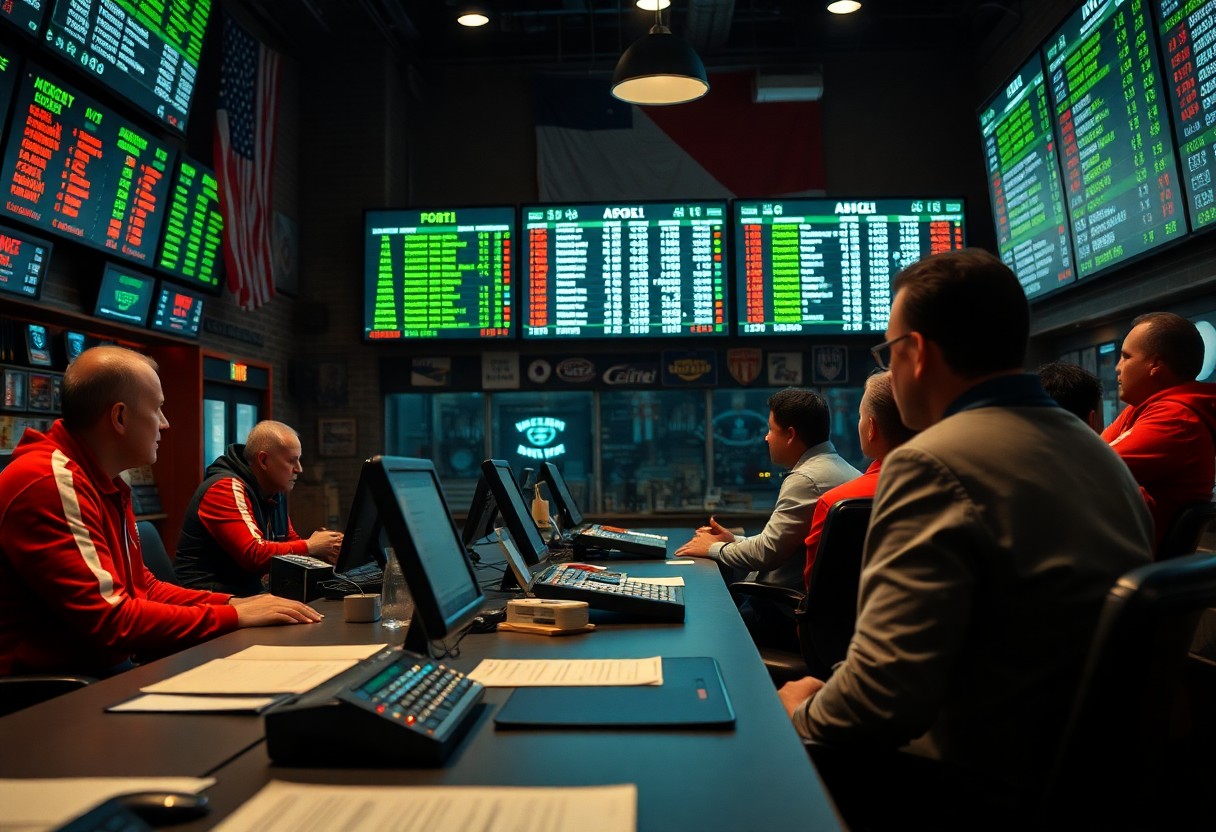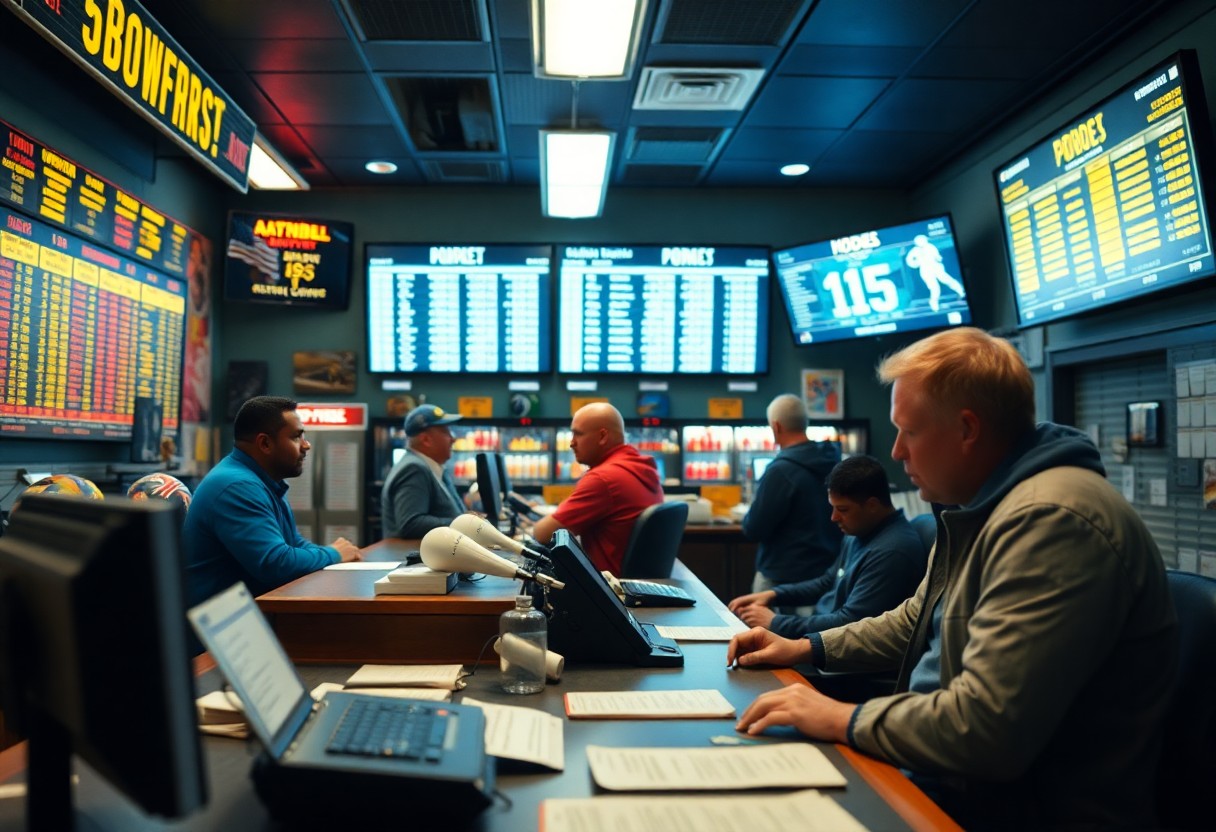It’s crucial for you to understand the key factors that shape sports betting odds, as these elements can significantly impact your wagering decisions. Various aspects, such as team performance, injuries, and public sentiment, work together to create the odds you see. By being aware of how these influences interact, you can improve your betting strategies and enhance your chances of success. This post will examine into the dynamics of sports betting odds, giving you valuable insights to make informed decisions.

Understanding Sports Betting Odds
For anyone venturing into the world of sports betting, grasping the fundamentals of betting odds is necessary. These odds serve as critical indicators of a team’s or player’s likelihood to win, guiding you in making informed betting decisions. By understanding how odds work, you can enhance your overall betting strategy and potentially increase your profitability.
Definition of Sports Betting Odds
With sports betting odds, you’re looking at the numerical representation of an event’s probability to help you gauge potential returns. These odds reveal how bookmakers balance their risk while determining payouts based on their assessment of outcomes. Understanding this can empower your betting strategy immensely.
Types of Betting Odds
Betting odds come in various formats, each providing a different perspective on a wager’s risk-reward ratio. Here are the three primary types you need to know:
| Decimal Odds | Widely used in Europe, showing total payouts including stake. |
| Fractional Odds | Common in the UK, representing profit relative to stake. |
| Moneyline Odds | US-oriented approach indicating the favorite or underdog. |
| American Odds | Displayed as positive or negative numbers; easy to interpret. |
| Parimutuel Odds | Wagers pooled together, and payouts depend on the pool’s total. |
This variety in betting odds allows you to choose the format that resonates best with your understanding, enhancing your betting experience.
Another key aspect to consider is how different formats may appeal to different betting strategies. Depending on your familiarity with each type, you might prefer one over the others. Understanding these differences can greatly influence your approach to betting:
| Risk Assessment | Each format influences your perception of risk and reward. |
| Market Awareness | Different odds highlight varying market sentiments on outcomes. |
| Profitability | Understanding types helps you maximize potential returns. |
| Bet Placement | Each format requires strategic betting placement. |
| Local Preferences | Regional biases may affect which odds you encounter. |
This comprehension of how betting odds function equips you with enhanced tools to navigate the sporting landscape effectively.
Key Factors Influencing Odds
Some of the most significant aspects that affect sports betting odds include:
- Team Form
- Head-to-Head Records
- Weather Conditions
- Betting Trends
Assume that you are aware of these factors; they can dramatically shift the betting landscape.
Team Performance and Statistics
Performance is all about evaluating recent match results, points scored, and overall team dynamics. You should closely analyze statistics such as wins, losses, and point differentials, as these contribute significantly to setting and adjusting the odds for upcoming games.
Player Injuries and Suspensions
By assessing player injuries and suspensions, you have a better understanding of how a team’s strength may be compromised.
At times, a key player’s absence due to a critical injury or suspension can lead to a major shift in the team’s performance. For example, losing a top scorer or defensive player can drastically affect the overall strategy and effectiveness of your team. Bookmakers will adjust the odds accordingly, often resulting in better opportunities for you to capitalize on favorable betting lines if you’re quick to identify these changes. Keeping an eye on injury reports and player statuses can provide you with advantageous insights.
Market Influence on Odds
Once again, the dynamics of the betting market play a significant role in shaping sports betting odds. Market forces, including supply and demand, can heavily influence the odds that sportsbooks set. As more bettors engage with particular odds, sportsbooks will adjust to balance their risk and ensure profitability, leading to shifts that can impact your betting strategy.
Public Betting Trends
Trends in public betting can significantly affect the odds offered. When a majority of bettors favor one side, the odds may shift to encourage bets on the opposing side, thus balancing the sportsbook’s exposure. By understanding these trends, you can gain insights into potential value bets often overlooked by the casual bettor.
Professional Bettor Impact
By analyzing the actions of professional bettors, sportsbooks adjust their odds to mitigate risk. High-stakes wagers from seasoned bettors signal confidence towards a particular outcome, prompting sportsbooks to change their lines quickly. This adjustment can create opportunities for you, as their reaction may create favorable odds for the opposing side.
Consequently, observing the betting patterns of professional bettors can be highly advantageous. Their wagers often lead to instant moves in the odds; as sharp money floods in on a certain side, sportsbooks may lower its odds or increase the odds for the other team, creating value opportunities for you. Being attuned to these movements allows you to bet smartly and leverage where the market is headed. Pay attention to when professional influences arise, as they can significantly tilt the odds in your favor.
External Factors
Now, various external factors can significantly impact the odds of your sports betting experience. The landscape is always changing, and it’s important to stay informed. Key elements influencing these odds include:
- Weather conditions
- Venue and travel considerations
- Player injuries
- Team performance metrics
- Cultural influences
After understanding these elements, you’ll be better equipped to make informed betting decisions.
Weather Conditions
Conditions such as rain, wind, or extreme temperatures can greatly affect gameplay, influencing the overall performance of the teams involved. These elements may lead to a shift in odds, making it crucial for you to analyze weather forecasts before placing your bets.
Venue and Travel Considerations
An understanding of the venue and travel implications can also play a significant role in sports betting odds. The location of the game, especially if it’s a home game for one of the teams, can absolutely sway the results and odds in favor of that team, as they often have a supportive crowd and familiarity with the playing conditions. Travel fatigue can impact player performance; long-distance travel can lead to diminished energy levels and focus. When teams travel, especially across time zones, your analysis should factor in distance, time zone adjustments, and the overall environment of the venue for accurate betting decisions.
Plus, taking note of team familiarity with the venue and how they perform in specific conditions can significantly influence your betting strategy. You should also consider any atypical factors associated with the venue, such as altitude or field conditions, which could either amplify a team’s strengths or expose their weaknesses. Understanding these subtle yet impactful details ensures you make the best possible decisions when betting.
The Role of Sportsbooks
Unlike casual betting enthusiasts, sportsbooks play a pivotal role in shaping betting lines and odds for various sports events. They utilize a combination of statistical analysis, expert opinions, and market trends to establish betting odds, ensuring they remain competitive while managing their risk. Your understanding of how sportsbooks operate can enhance your betting strategies and improve your chances of making informed wagers.
How Oddsmakers Determine Lines
Behind the scenes, oddsmakers utilize extensive data, including player statistics, team performance, and historical trends, to set initial betting lines. They also consider external factors like injuries, weather conditions, and public sentiment, which can influence general betting behavior. By analyzing this information, oddsmakers aim to create a fair line that attracts balanced betting on both sides, thereby minimizing their risk.
Adjustments and Reactions to Betting Patterns
Determine how sportsbooks respond to betting patterns by monitoring the flow of money on each line. When a significant amount of money is wagered on one side, sportsbooks will adjust the odds to discourage further betting on that outcome, maintaining a balanced book. This proactive approach ensures that your betting opportunities remain competitive while the sportsbook mitigates its exposure to potential losses.
The adjustments made by sportsbooks are driven by real-time data and betting patterns. When you see a sudden shift in odds or lines, it is often a reaction to heavy betting activity on one side, prompting the sportsbook to protect its financial interests. Common adjustments include shifting the point spread or altering the money line. It’s important for you to stay alert to these changes, as they can indicate how the market views the respective teams’ chances and may provide insight into potential value bets.
Psychological Aspects
After understanding the various factors influencing sports betting odds, it’s vital to research into the psychological aspects that can affect your betting strategy. Your mindset, emotions, and behavioral patterns play a significant role in how you approach betting, often subconsciously guiding your decisions. By being aware of these psychological influences, you can better manage your betting behavior, leading to more informed decisions and potentially more favorable outcomes.
Bettor Behavior
At the heart of sports betting is bettor behavior, which encompasses how you react to wins and losses. Your emotional responses can lead to tendencies such as chasing losses or becoming overly confident after a win. By recognizing these patterns, you can seek to mitigate irrational decisions that stem from emotional investments in your bets.
Decision-Making Processes
For many bettors, the decision-making process is a blend of data analysis and personal emotions. You need to evaluate the odds, analyze team performance, and also consider your own feelings regarding the bets you place.
In addition, being aware of your instincts and biases can significantly impact your betting results. Overconfidence can lead to poor judgment, while fear of missing out might push you to place bets you wouldn’t usually consider. It’s vital to synthesize data analysis with your emotional responses to ensure a balanced decision-making process. Maintaining a disciplined approach can help you break negative habits and foster a more constructive betting strategy.
Final Words
To wrap up, understanding the key factors that influence sports betting odds can significantly enhance your betting strategy. By considering elements such as team performance, player injuries, weather conditions, and public sentiment, you can make more informed decisions. Additionally, staying updated on market trends and utilizing odds comparison tools will ensure you are getting the best value for your wagers. With this knowledge, you can approach sports betting with confidence and potentially increase your chances of success.




